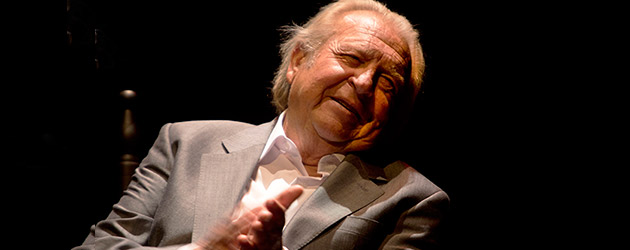Text: Estela Zatania
Photos: Jean Louis Duzert
Thursday, January 23rd, 2015. 8:00pm Nimes (France)
JUAN PEÑA «LEBRIJANO» TRIUMPHS AT THE FESTIVAL DE NIMES
Cante: Juan Peña «Lebrijano». Guitar: Pedro María Peña. Voice and lute: Mohamed Amine Talassaine. Qanún: Youssef El Mezghildi. Violin: Faiçal Kourrich. Percussion: Agustín Henke Santamaría.
The nostalgia of a singer who dared to commit fusion
In the program notes of the recital that took place Thursday at the Bernadette Lafont Theater, it said this singer had been an «unjustly ignored revolutionary». I don't know. For the last fifty years he's been one of the most admired and well-considered interpreters of the genre, topping the bill of a good part of the historic cante festivals of the seventies and eighties, along with other top stars like Camarón and Fosforito, and with an extensive discography with guitarists like Niño Ricardo, Manolo Sanlúcar, Enrique de Melchor and even Paco de Lucía.
You know you've made it when your performance is announced, as it was here at the Festival de Nimes, with a single name, not even a proper name but a nickname: «El Lebrijano» is more than enough information to identify the maestro from Lebrija, Juan Peña Fernández. He started out as a faithful follower of the most traditional sort of flamenco singing in the line of Antonio Mairena, but felt the pull of the times he lived through, and was one of the first to travel the experimental path in a movement that would come to be known as «fusion».
For those people into blood-lines and such, Lebrijano belongs to the Peña Perrate family of the geographical axis of Lebrija and Utrera, from the branch of the Negros de Ronda. For those who simply enjoy good music, Juan Peña is the flamenco singer who has best been able to combine the exotic sounds of North African music and flamenco.
From the first sound of his voice…«Truena, mira como truena»…through cantiñas de Lebrija with mirabrás, a varied series of soleá with many personal touches, siguiriyas in which the singer asked Pedro María Peña to raise the guitar a half-tone and went on to interpret difficult styles such as toná liviana and «reniego», Lebrijano felt strong and gave everything, to the limits of his capacity.
The Arabic music is an absolutely irresistible and necessary element in the work of Juan Peña. With the violin of Faiçal Kourrich who has been by Lebrijano's side since the first experiments with this music, in addition to the sensitive voice and lute of Mohamed Amine Talassaine, the qanun of Youssef El Mezghildi and the percussion of Agustín Henke Santamaría, the gypsy from Lebrija, steeped in the most classic flamenco, can be seen to be having a ball with this group. «Calle de San Francisco» opens a friendly facing-off with the Arabic singer which serves to highlight more compatibility than differences between the two styles.
Nostalgia is guaranteed with verses such as «Dame la libertad» and «Porque se casa», in which Juan invites the audience to clap along, «and anyone who feels like dancing should dance, no reason to be shy». The audience responds with one ovation after another, and it's great to see the veteran singer at the end of the recital, rejuvenated and happy, as in his best years.
